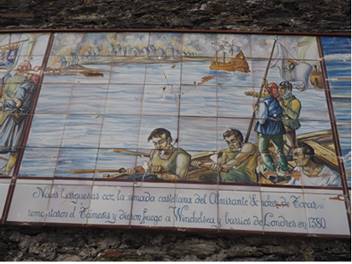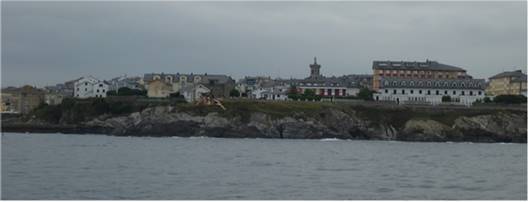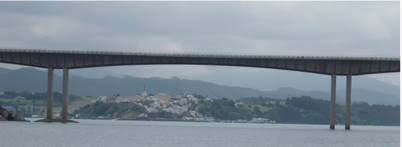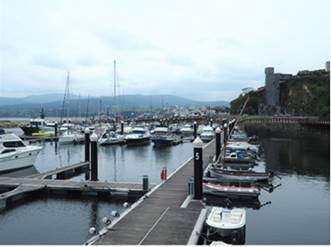22 June at Ribadeo

43:32.4N 007:02.1W We awoke on Thursday to the sound of soft rain. It must have driven off the revellers who celebrated the Summer Solstice into the early hours on the end of the pier at Luarca, but they left most of their rubbish behind anyway!
Interesting Spanish perspective on their part in the Hundred Years War – a ceramic at Luarca We spent the morning going through some of our safety equipment and then, once things started to dry out, clouds lifted and the visibility improved, we set sail for Ribadeo. Or rather, we motored. Once again, no wind. We paused briefly at the port of Tapia because it looked interesting on the chart and from seaward. Clearly focused on fishing, there were no pleasure boats of any kind but it did look rather attractive. At the harbour entrance there was a huge pile of old furniture and doors piled up, so presumably a bonfire was in the offing.
Tapia Ribadeo is in Galicia. The river marks the border with Asturias and it is quite attractive, even on a grey day. There is a huge road bridge across the harbour entrance and on the western shore the town of Figueras has what appears to be a busy shipbuilding and repair facility. Probably about the size of the one we used to have at Appledore before ‘market forces’ shut it down. Castropol is on a small headland a little further up the river on the Asturian side and looks idyllic: a rowing club, a small white town perched on a hill with the church spire in charge.
Spanish shipbuilding
Castropol from the sea The main reason for visiting Ribadeo was to eat dinner at the Parador there. Paradors are State-owned hotels, usually with high quality restaurants designed to show off regional cuisine to natives and travellers at a reasonable price. Along the Pilgrim’s routes to Santiago de Compostela, you can get a discount at the Paradors if you are a pilgrim. Our short foray at Luarca didn’t count, but I felt pious as a result. Walking in the Picos de Europa a few days earlier demanded lycra, reflective sunnies and walking poles to be considered authentic. All the pilgrim needs is an old fashioned backpack, some ‘Empire builder’ shorts and a floppy hat. That’s me.
Lower Ribadeo Anyway, with or without a discount the view from the Parador de Ribadeo across the harbour is brilliant, the place is at 4* standard – at least in the public rooms – the food was excellent (and cheaper than France) and the staff friendly. I feel dangerously like a Tripadvisor reviewer so I won’t list the menu or provide photos of dishes, but I’d say it was definitely worth the effort. Julie is now researching our itinerary based on a list of Paradors in Galicia… The town is very pleasant; more affluent than Luarca, much smaller than Gijon, the buildings are in better nick and whilst graffiti still abounds, I did not find any Soviet-style sculptures and they were obviously trying to preserve the old library in the main square rather than replacing it with a Cubist monstrosity. We found Camping Gaz in the kitchen design shop (where else would you look?) soda bread in the ‘artisan’ bakery and All Bran in the supermarket. Their Cubist monstrosity is the lift from the harbourside up to the town centre – I can’t imagine why they decided to build it but I imagine there was some Brussels money on offer somewhere. Apart from the whiff of stale urine, it was most effective on the way up to the restaurant, but closed when we rolled home.
The lift is the thing that looks like a mineshaft on the right… Off to the first of the Rias next! |





